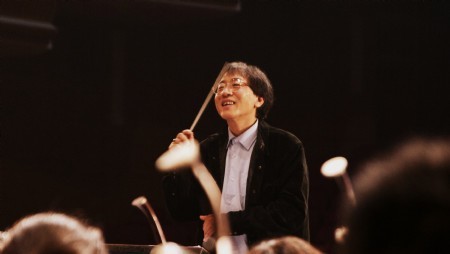Gao Dalin is the Permanent Conductor of the Dalian Art College. He was born into a musical family; his father ,Gao Yang, was a well-known composer, his mother a singer. He began to learn to play the violin at the age of 6, and learned piano from the famous composer Liu Xijin at the same time. He learned elementary composition from his father at the age of 14. He was admitted into the specially enrolled class of the Affiliated Central Orchestra of the Central Conservatory of Music in 1977, composed “Spring Flower” for dance performance in the same year and won a first prize at the Harbin Summer Music Festival. He studied bassoon with the famous concert performer Liu Qi as his tutor, and studied piano with the famous pianists Qian Shenying, Chen Jingzhai, Yin Chengzong ,etc. respectively as his tutors. In 1978, he composed the symphonic poem Quafoo Chasing after the Sun, which was premiered by the Central Orchestra; he took part in the first symphonic concert for China’s new creations after the reform and opening up, and was reputed to be “the most promising young composer”. In the same year, he learned how to compose music by studying with the famous composer Professor Luo Zhengrong as his teacher. In 1979, he learned conducting from the famous conductor Seiji Ozawa as designated by the Ministry of Culture, and composed the symphonic poem Dream in the same year, for which he was lauded as an “Outstanding Youth of the Ministry of Culture”. In 1980, he entered the Symphonic Band of the Central Philharmonic Orchestra, and served as bassoonist. During the same period, he took part in preparing to establish the “Beijing Youth Philharmonic Orchestra” and served as a director and assistant conductor, learning conducting from the famous conductors Xu Xin and Li De. After 1981, he served as Music Advisor to Yunnan Music & Video Publishing House, Qilu Video Publishing House, and Guangzhou Record Co., Ltd successively, and created, produced, and conducted many musical works. He composed the North Shaanxi Suite for the concert for U.S. President Ronald Reagan’s visit to China, the overture to A Midsummer Night’s Dream, and served as the conductor. He took part in the creations for the Asian Games, the Winter Games, the Spring Festival Gala of the Ministry of Culture and other large evening parties. The symphonic suite Six Chinese Folk Songs that he created was once performed by the China National Symphony Orchestra, the China Philharmonic Orchestra, and the UK’s Royal Philharmonic Orchestra, and performed in the Gold Hall of Vienna by the Vienna Philharmonic Orchestra.
